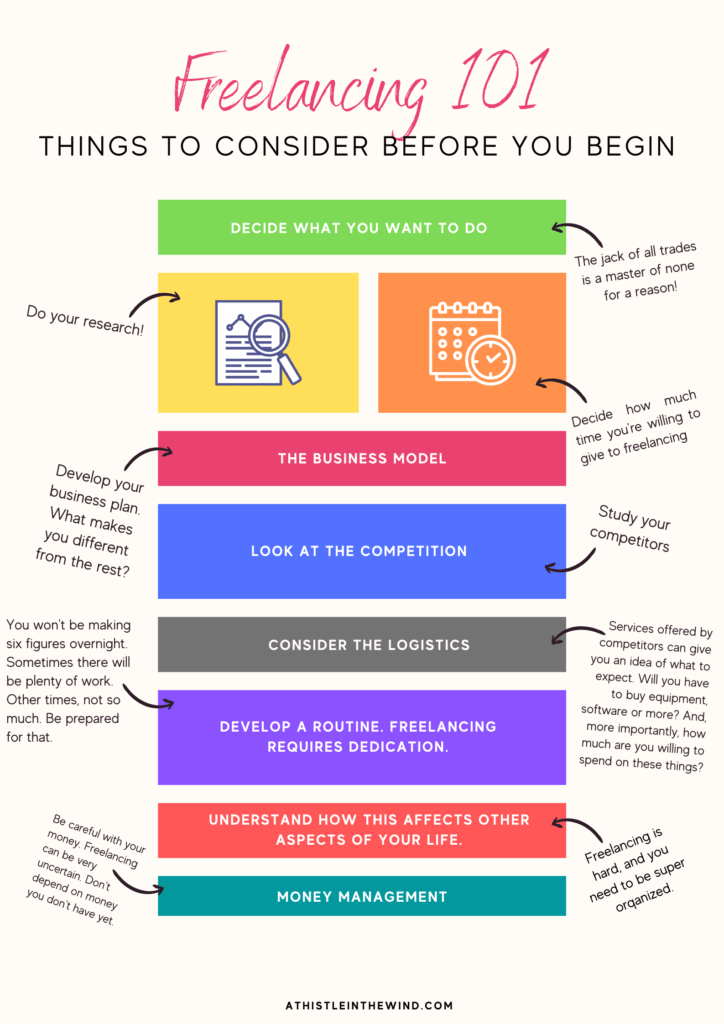
Freelancing 101: Things to Consider Before You Begin
Freelancing seems to be the new buzzword in town. Especially since the pandemic changed the way we work. But freelancing isn’t all that new.
Now, it sure sounds like a new concept. After all, I’m pretty sure growing up, most of us never heard of “freelancing”. It’s just not something that came up. It was very rare. Of course, sometimes we’d see the title “Freelance Journalist” on BBC or CNN, but that was rare too.
Growing up, the only time I came across it was when I read this book in fourth grade, and the writer was described as a freelance muralist. I still don’t really understand what that is.
But hey, to each their own, right?
It’s the twenty-first century. If you want to do something, I think it’s only fair that you learn how to monetize it.
And that’s exactly where freelancing comes in.
If you’ve got a set of skills and you’re decent at it (you don’t even have to be the best at it anymore), you can monetize it as long as you know how to do it.
Now, you could go to a company and offer them your skillset. But chances are, if you do that, you’re going to have to prove that you’ve got the experience and the technical know-how to succeed.
Sometimes, we don’t have the experience. Sometimes you just like doing something and everyone around you agrees that you’re pretty good at it, and that’s it.
It’s not that deep.
And it doesn’t have to be either.
But what does make a difference is whether you’re willing to monetize your skills or not.
Should You Begin Freelancing?
Well, the short answer is yes. After all, why shouldn’t you be freelancing? It’s a great way to improve upon and benefit from existing skills. It’s a great way to make money, and you get to be your own boss.
But that’s the standard answer most freelance gurus (I’m not sure if that’s a thing, but it sounds about right) will give you.
On the surface level, it may seem as though freelancing is terrific. Which it is if you’ve got the aptitude for it. Even though it will be my fifth year in the freelancing world next month, I don’t love it.
The truth is, freelancing is hard. Without the right connections, in the beginning, it can be very demotivating. For me, my first three years were tough.
It seemed like no matter what I did, I would never get the better-paying gigs, the freelancer support staff would always side with greedy employers, and I was constantly outsourced work by bigger writers on the platform because I charged less.
My Early Days
I’m serious. In my first month on Freelancer.com, I wrote a whole thesis on data structures for a girl I thought was a student. I later discovered that she had built an audience by outsourcing her work to writers like myself for low prices.
For me, earning my first $40 was amazing, so I didn’t care that I was writing 20,000 words for just $40. I was writing, and I liked it. But, of course, I later realized that I was being exploited, and she threatened to leave a bad review if I continued to demand higher wages.
And I couldn’t say no. I mean, I could. But I’d have no projects then, and no projects meant no reviews, and no reviews meant that I would have no history of serving top-tier content. I was able to make a relatively successful income through the website. In fact, some of my biggest clients came to me through Freelancer.com. However, there were still many employers who would scam and it eventually got too much for me.
These days I don’t use my account on that website but if you’re looking for a good place to start, I think Freelancer.com‘s pretty cool. I’ll talk about freelancing sites in the future.
I don’t use any third-party freelancing platforms anymore, except for Fiverr.
But doing it all on your own can be equally as hard. At the end of the day, freelancing websites ensure that you get paid. Of course, I got duped a bunch of times, but I was eventually able to spot bad clients from the get-go and refused to work with them.
That’s not all, though.
Things to Consider Before You Begin Freelancing
If you’ve got experience dealing with people, you don’t have to worry about getting conned.
In truth, many people don’t like freelancing because of its “unreliability.” Which I think isn’t fair. After all, traditional jobs are unreliable too. Sure, they’re “permanent”, but you could get dismissed or laid off anytime too.
Whether it is because of a pandemic or a financial crisis, I don’t think anyone’s safe in this economy. Besides, with the rise of social media, there’s been this rise in small businesses. Sometimes, all you need is a laptop and internet connection, and you’re good to go.
I believe that if you have a skillset, you should be able to monetize it. That’s a talent, and monetization shouldn’t mean that you’re going to do that for the rest of your life either.
You could be an accountant who loves their 9 to 5 but enjoy selling cupcakes on the weekends too. Or, maybe you just like being your own boss.
Either way, freelancing offers you the freedom that a regular job can’t. That makes it really convenient for a lot of people.
And the extra income, of course.
Sometimes, you’re looking for experience too. A lot of copywriters and journalists start off as freelancers because they want exposure and experience to polish their resumes.
Like everything in life, there are pros and cons to freelancing. But if you’re seriously considering freelancing, here are a few things you should think about.
It’ll definitely make your experience much, much better.
1. Decide What You Want to Do
In recent years, many of my friends have asked for “tips” to help them get freelance jobs. The thing is, your freelancing approach will depend on what you’re doing. While it’s widely regarded as one of the easiest gigs, copywriting isn’t just about forming sentences.
I think anyone can write, but not everyone can do copywriting. First of all, there’s a difference between writing and copywriting. People don’t know that.
You can learn it, of course. There are plenty of great copywriting courses available online. But there’s always room to grow. Every few months, I take new courses on copywriting because the way we consume content is constantly changing.
It’s important that you understand what you want to do and the work you’ll have to put into it. You can’t say that you’ll write, edit, and design a website because you learned to make a simple website in eighth grade.
I’m pretty sure the person hiring you can do that as well. They’re paying you because they expect that you’re a professional.
You have to make sure that you give them the best service possible. So, think very carefully about what you’re going to do.
Of course, I recommend that you take on easier gigs initially and eventually build onto that. Fun fact: I actually only have three-ish years of SEO experience.
I just wrote reviews and first-person perspective blogs for a very long time. It was only after one of my employers made me refer to Google’s SEO best practices in 2019 that I got interested in SEO and took a course three months later.
2. Do Your Research

This is actually the fun part. You don’t have to become a freelance copywriter or graphic designer. If you have a skill, all you have to do is figure out how to monetize it. Do some research, ask around, and you’ll probably be able to find a unique opportunity.
I actually had some legal stuff to take care of recently (and that’s why I’ve been MIA), and I didn’t know any lawyers who could help me with it because it involved another jurisdiction.
So, I causally searched for legal services on Fiverr and found someone actually offering them. It was the very service I needed, and that’s how I was able to FINALLY sort my problem.
If you have a skill and you do the research needed, I’m pretty sure you can find an audience for it.
3. Decide How Much Time You’re Willing to Give It
Once you’ve decided what you want to do, discovered an audience for it, you should decide how much time you’re willing to put in. Remember that this isn’t your primary source of income.
Of course, a lot of freelancers end up making it their full-time job, but in the beginning, it’s not that. It’s not even a side hustle. It’s just something you do every now and then, without a fixed schedule, for the experience or extra income.
Depending on how busy you are, you need to understand and set aside time to actually look for some gigs and complete them. If you’ve decided that you can only work three hours a day, take a gig that will take only three hours.
Don’t take the $1800 gigs that will consume your entire month. It’ll be tempting but don’t. Especially if you’re a beginner and don’t really know much about the industry. Chances are, you’ll fail to deliver, and you won’t even get paid for the hours you put in.
4. The Business Model
Next up, you need to think of a business model. The best way to make sure that you’re not tempted to take on projects beyond your skillset is by ensuring that you’ve got a good business plan.
Think about what you’re going to charge, how much time you’ll allot to various orders at a time. Look into taxes (some of us didn’t), regulations and especially consider the time it takes for freelancing websites to verify your identity.
Yes, this is a thing. Many freelance websites ask you for your driver’s license, government ID, utility bill, proof of address and sometimes even passport. This is all for verification purposes and to make sure that when you withdraw your earned cash, it goes to you only. They also ask for bank details and sometimes block a payment if they feel you’re not who you claim to be.
You might want to check this out after you’ve earned the minimum amount needed to withdraw. Most people prefer withdrawing large sums of money because there’s a fee associated with withdrawals. But you should do that after you’re sure that you’re able to withdraw in a short time.
Usually, withdrawals take 2 to 3 days. But, in the first time around, it can take up to a month.
5. Look at the Competition
Next, you need to look at your competition. There’s a market standard to how business is done, and this is especially highlighted when you’re working through a third-party platform. For example, all the top-tier freelancers on Freelancer.com have corporate or premium accounts to set themselves apart. They also have an extensive library of samples.
On Fiverr, you’ve got to put up your profile picture on your gig. I don’t really get why it’s done. After all, given Fiverr’s user interface, you’d think a good sample or two would work. But no, it’s just a standard- you have to your picture on your gig to get an audience.
I read somewhere that employers feel more comfortable when they see people like themselves on an account, it adds this “human” feel to it, but I think it’s weird.
But it’s the standard.
Also, you’ll want to look at your competition to see what they’re charging and tailor your pricing accordingly. You need to offer better prices, better services and quicker turnarounds. The thing about the most popular freelancers is that they’ve got a lot of clients. So, they’re probably delivering in four or five days.
Offer 24-hour deliveries, but only what you can manage.
6. Consider the Logistics
It’s imperative that you consider all forms of disruptions, potential drawbacks and the overall effects of providing certain freelance services. For example, if you’re a photographer, you might want to consider the practicality of offering natural photography services when you live in a big city.
Sure, you might have a national forest an hour or two away, but be realistic. How often can you go there? Also, consider the cost of transportation, the time it takes, and the equipment you’re using.
7. Develop a Routine
I’ll admit that this is a mistake that I made in the beginning. I thought that because it was the start of my freelance career, I needed to be online all the time, looking for employers. Sure, that did help drive sales, but it was also extremely stressful.
It was my first year at university and but instead of going to my classes or studying, I was actually more focused on building my clientele. Yes, that’s something I think about often and regret.
In the end, I was able to get decent grades, but it wasn’t just the academic loss I experienced. I was constantly bailing on friends, family and eventually, in the fourth month mark, I had to take a break.
From university and the freelancing thing too. I don’t know what it was, but on Freelancer.com in particular, I think it’s the fact that you’re pitching your ideas and actively talking to employers that really motivated me.
These were actual people who trusted me and believed that my work was good enough for them to hire me. I don’t know about you, but I felt so accomplished that I was willing to risk my health, my education and social relationships for it.
I think it’s because I genuinely really like writing, which is why I recommend that you think a lot before deciding what to do.
But don’t be online looking for employers all the time. Set aside two or three hours every day, and you’re good. Actually, don’t do that.
Don’t listen to what anyone says about the “recommended” time. You know how long it’ll take you to do a gig, so set aside a half or double of that time every day. Just make sure you don’t ruin your routine. Learn to work around the things in your daily life. It’s freelancing, not a part-time job.
8. Understand How It Affects Your Life
As I mentioned in the previous point, it’s very easy to be consumed by freelancing, especially if you immediately start getting orders. However, you need to understand that this is a part of your life, not your entire life.
You need to learn how to manage your time efficiently.
Of course, on the other end of the spectrum, you’ve got people who put in the bare minimum effort into their gigs. That’s bad, of course. You need to learn to balance everything efficiently. If you don’t have the time to freelance every day, do it once a week.
There’s no hard and fast rule, but you can’t let your life affect your work, and alternatively, let your work affect your life.
9. Money Management
Lastly, you need to be very, very particular about your income. When you begin freelancing, you’ll notice that there are days where you get three new gigs, but there are also days where you get none. Therefore, it is very important to ensure that you’re managing your money properly.
When you’re getting consistent, continuous orders, it can be tempting to overindulge, but don’t be fooled! Leave some for a rainy day because it will come eventually. It always does, but you can make sure that you’re comfortable when it happens.

Make Sure You’ve Dealt with Everything Before Beginning
Once you’ve seriously considered the points above, you’ll be in a much better position to start freelancing. Remember, this line of work is all about managing expectations: your expectations and your employers’ too.
If you’re considering writing, I strongly recommend that you begin blogging first before graduating to SEO. You can check out my tips on how to write your first blog post. While the premise of the post talks about the literal first post on a blog, if you’re a new writer, you can use that as a template for standard articles.
I’m thinking of doing more Freelancing 101 articles in the future, so if you have any suggestions. Let me know!
Cheers,
Sura x



12 Comments
sydney pools
Hello, you used to write excellent, but the last few posts have been kinda boring… I miss your great writings. Past few posts are just a little bit out of track! come on!
athistleinthewind
Hi, thanks for coming back to the blog! I’m in the process of recovering the site completely as it was down for 6 months. There’s a lot of information still missing. Once I’m done with that, I’ll get back to writing again:D
tlo
Normally I do not read this much, but I wish to say that this write-up very forced me to try and do it! Your writing style has been amazed me. Thanks, quite nice post.
danne
Lovely site! I am loving it!! Will come back again. I am bookmarking your feeds also.
ZVI
Great piece!
Kayla
can you create a blog on how to start freelancing?
Pax
Good tips! I came from pinterest. do you write about traffic growth on pinterest?
Elliot
I make video edits for a living and I agree with what you’ve shared here!
Prach
thank you for this post! i gained good knowledge 😀
Samara
I think freelancers should definitely consider these points before starting
Zapoya
Great ideas!!!
Benjamin Banks
I think this article is very old but it’s still relevant today. An update much appreciated!!!